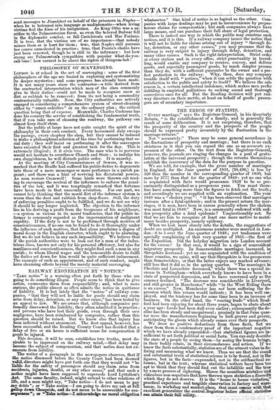THE ERROR OF STATISTS.
" Ewan marriage," Says the Registrar-General, in his Quarterly Return, " is the establishment of a family, and is generally the result of some deliberation. It is not surprising, therefore, that the prosperity of the country and the prospects of the psi should be expressed pretty accurately by the fluctuation in marriage-returns." Not " accurately." There may be some general accordance in the fluctuations of prosperity and marriage ; but there is no suclt strictness in it that you can regard the one as an accurate ex- pression of the other. On the text from the Registrar-GeaieraV however, the journals are ringing the changes in a peal of gratu- lation at the universal prosperity ; though the returns themselves establish the inaccuracy of the data for the purpose in question. We are told, for example, that the gross number of marriage.s in F.ngland, for the Tune quarter of 1851, (88,498,) is less by 520 than the number in the corresponding quarter of 1850, but more by 3777 than that for the quarter of 1848: yet no one who is acquainted with facts would pronounce 1850 to be so pre- eminently distinguished as a prosperous year. You must there- fore have something more than the figures to fetch out the truth.; and accordingly we are supplied with an explanation. The year 1849 was a " cholera year": " it has-been observed that marriege's increase after a fatal epidemic; and in the present return the mar- riages, it is seen, have been in excess generally where the cholera was most fatal in 1849." Now, is a community endowed With sud- den prosperity after a fatal epidemic? -Unquestionably not. So that we are fan to recognize at least one more motive to matri- mony besides prosperity, namely epidemy. When we look more closely into the details, the suggestions of doubt are multiplied. An enormous number were married in Lon- don-6 to 5 over the Tune quarter of 1848; yet tradesmen were specially complaining of that very quarter of 1851—the first of the Exposition. Did the holyday migration into London 'account for the excess ? In that case, it would be a sign of nonresident migratory prosperity. In Somersetshire marriages increased, in Shropshire decreased : yet no one acquainted with the oonilition of those counties, we opine, will say that Shropshire is lees prosperous than Somersetshire, or that the latter enjoys any marked advanee; still less that it did so in the spring quarter. "The marriages in Cheshire and Lancashire decreased," while there was a special in- crease in Nottingham—which everybody 'knows to haveleen in a state of pauperized depression, and to lave recovered only as the summer declined. "The decrease was considerable in Liverpool, and still greater in Manchester," while "in the West Biding there is an excess." Now, Manchester has not been suffering the de- pression which this return would indicate; it has been well em- ployed, and the tendency has for some time been to an increase of business. On the other hand, the " roaring -trade' which Brad- ford had been enjoying for about three years, 'began to abate about a year ago : Leeds had been dull even earlier; subsequently the de- cline has been steady and unequivocal; precisely in that Tune quar- ter were the manufacturersbeginning to look graver and graver, anticipating the gloom which already conies over their prospeots.
We draw no positive deductions from these facts, but, we draw from them a confirmatory proof of the important negative which we have already expounded—that statistical figures are in- sufficient to set forth political or social facts. 'You can only describe the state of a people by circumstances them—by seeing the human beings,
in their bodily estate, in their circumstans and action. If -we know the facts substait itially, statisticsare of the utmost value in de- fining and measuring what we know. Thus we see that the sound and substantial truth of statisticalscience is to be found, not in the figures, hut in the faets—expounded, not in the arithmetical co- lumns, but in the teat; whereas statistical writers have been too apt to 'think that they should find out the infallible and the true by amere process of ciphering. Hence the countless mistakes and ridiculous non-sequiturs thathave thrown upon statistics a discredit which they do not deserve. It is the "house to house visitation;" al experience and tangible observation in factory and ware- e at: in workshop and market-,place, that must concur with that exoellent generalizer the central.liegistrariefore ,o1Seiel statistics can attain their fill


























 Previous page
Previous page